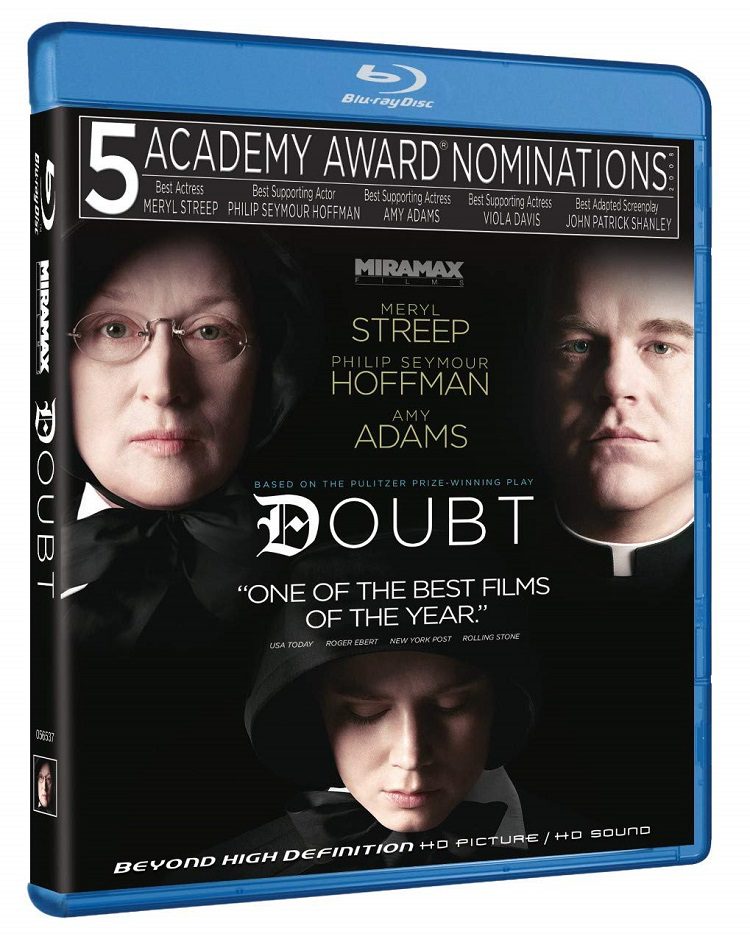
In a Bronx Catholic church, a year after Kennedy’s assassination, recently arrived Father Flynn (Philip Seymour Hoffman) gives a sermon about doubt. Sister Aloysius (Meryl Streep), principal of the church’s school, is intrigued by the sermon’s origin, because it comes from somewhere, and she suggests to her fellow Sisters of Charity to keep an eye out for anything suspicious.
Sister James (Amy Adams) notices a seemingly unusual closeness between Father Flynn and Donald Miller, an altar boy and the school’s only black student. During her class, Donald is called to the rectory to meet Father Flynn. Upon his return, Donald appears bothered, and she notices alcohol on his breath. Later, she witnesses Father Flynn place a shirt in Donald’s locker, and reports what see has seen to Sister Aloysius, who is troubled because she has seen inappropriate relations between priests and boys before in the Church.
Under the guise of discussing the Christmas pageant, Sister Aloysius, with Sister James recounting what she witnessed, confronts Father Flynn, who doesn’t wish to discuss the matter. Feeling this confirms his guilt, Sister Aloysius continues to press until he reveals Donald was caught drinking sacramental wine and was dealing with it privately. However now that it had come out, Donald would lose the privilege of being an altar boy. Sister James is relieved and accepts Father Flynn’s explanation. Sister Aloysius refuses to believe him, trusting her own certainty on the matter.
After Donald’s mother (Viola Davis) visits with Sister Aloysius, Father Flynn demands she stop her witch-hunt. She refuses, stating she is willing to sacrifice everything to see justice done. She wants his confession, but he repeats there’s nothing to confess. Although admitting he has sinned, Father Flynn never admits to Sister Aloysius’ charges and Shanley never gives us any proof, leaving the viewer only with Sister Aloysius’ certainty.
The story’s resolution leaves everyone deeply affected, including the viewer who is left to determine what really happened, but will never know if they are correct. For every opinion, there’s an equal and compelling counterargument to what the truth is, making Doubt about much more than the mystery presented.
John Patrick Shanley adapted and directed the film from his Pulitzer Prize- and Tony Award-winning play of the same name. His characters Sister Aloysius and Father Flynn are an interesting dynamic, representing different views on the direction of the church. She wants to keep the rituals and tradition; he wants the church to become more progressive. She’s conservative; he’s liberal. The viewer sees this from their views ranging from ballpoint pens to Christmas pageant music, yet Shanley refrains from casting heavy-handed judgments.
The performances by the main foursome are very well done, which is why they received all received Oscar nominations. Streep and Hoffman are particularly brilliant together, creating more fireworks and tension with their delivery of the dialogue than any CGI-filled summer blockbuster. Watching them talk and move around Sister Aloysius’ office in their final scene together is reminiscent of a ballet by two graceful dancers.
Although the strength of the film comes from the writing and one of the best acting ensembles of 2008, Shanley removes the staginess that affects many play adaptations. He does this in tandem with master cinematographer Roger Deakins as together they create wonderful imagery, such as pillow feathers blowing across the rooftops as a metaphor for the spread of gossip.
Doubt is presented in 1080p High Definition with a 1.85:1 aspect ratio. The image looks pristine. The details are sharp no matter the texture, from the ornate designs of Father Flynn’s garments to the brickwork on the buildings. The film makes a great use of color, using a muted scheme in the outside world and vibrant colors within the church buildings. The blacks, of which there are a lot because of the dress code, are very rich and allow for differentiation as the black buttons on the habits can be clearly seen.
The English audio is only available in 5.1 DTS-HD. Although a dialogue-driven film, the surround makes very good use of the ambiance, from the echoing of Father Flynn’s sermons in church to the children in schoolyard and cafeteria to the inclement weather. Howard Shore’s evocative score also fills the speakers. The subwoofer gets very limited use during thunderclaps.
The Bonus Features are led by Shanley’s commentary track where he offers his “random thoughts” about the film. He explains how it was informed by his youth and discusses production. What was most intriguing that he failed to discuss was during the final confrontation when Sister Aloysius asks Father Flynn about giving Donald wine, he says no yet nods his head, which is an intriguing non-verbal signal.
The remaining features, all in HD, include “Doubt: From Stage to Screen” where Shanley and the four actors talk about the transition to film. “The Cast of Doubt” are seated together when they talk with EW.com’s Dave Karger. “Scoring Doubt” features Shanley and Shore. “The Sisters of Charity” is a look at the sisters who discuss their order’s history and their lives. The disc does have one oddity: the inclusion of an anti-tobacco ad before the movie starts. It’s not clear why it’s included other than Father Flynn is seen smoking.
Without a doubt, I highly recommend seeing this movie, which looks spectacular on Blu-ray. It’s one of the few things I am certain about.